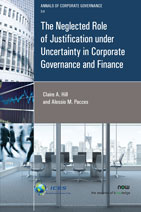The Neglected Role of Justification under Uncertainty in Corporate Governance and Finance
Claire A. Hill, University of Minnesota Law School, USA, hillx445@umn.edu , Alessio M. Pacces, University of Amsterdam and European Corporate Governance Institute, The Netherlands, a.m.pacces@uva.nlAbstract
A big corporate governance debate concerns the corporation’s time horizons and the balance of power between shareholders and managers. In response to pressure from shareholder activists – typically activist hedge funds – companies are, some say, becoming too short-term. If this is true, shareholders and the greater society may be being harmed. We argue here that this may reflect a heretofore neglected facet of decision-making: an actor’s accountability and her anticipated need to justify decisions in the case of a bad outcome. Our account does three novel things. First, we demonstrate that the need to justify is pervasive. Our account identifies a type of agency cost, “justification costs,” resulting from decisions motivated by justification. Second, to our knowledge, the relationship between these sorts of agency costs and more traditional agency costs has not been considered. Reducing traditional agency costs typically means increasing accountability and the consequent anticipated need for justification; in contrast, reducing costs of justification generally means increasing managerial leeway, which might increase traditional agency costs. Third, we introduce a role for uncertainty. We show that under conditions of low(er) uncertainty, more accountability does not necessarily increase justification costs but does reduce traditional agency costs. But under conditions of uncertainty, accountability increases justification costs, potentially in an amount greater than any reduction in traditional agency costs. We propose a mechanism by which managers and stockholders can agree on granting managers some leeway for a specified period of time, in the form of “Control-Enhancing- Mechanisms” (CEMs). A CEM may or may not condition continuing leeway during the period on management’s meeting certain agreed-upon conditions. We consider how our argument as to the existence of justification costs might apply in some private and public financial contexts, and suggest some solutions in those contexts as well.
The Neglected Role of Justification under Uncertainty in Corporate Governance and Finance
The Neglected Role of Justification under Uncertainty in Corporate Governance and Finance does three novel things. First, it demonstrates that the need to justify is pervasive and identifies a type of agency cost -- “justification costs” -- resulting from decisions motivated by justification. Second, it considers the relationship between these sorts of agency costs and more traditional agency costs, such as those involving self-dealing or empire building. Third, and most importantly, it introduces a role for uncertainty. Under conditions of low(er) uncertainty, more accountability does not necessarily increase justification costs, which are apt to be low in any event, and does reduce traditional agency costs. But under conditions of uncertainty, accountability increases justification costs, potentially in an amount greater than any reduction in traditional agency costs; under some circumstances, reducing accountability, thereby granting managers more leeway, may be preferable. The authors propose a mechanism by which managers and stockholders can agree on granting managers some leeway for a specified period of time, in the form of “Control-Enhancing-Mechanisms” (CEMs). They consider how the existence of justification costs might apply in some private and public financial contexts, and suggest some solutions in those contexts as well.
